Contract Law Issues: Gluten-Free Flour, Cake Color, Exclusion
VerifiedAdded on 2020/03/01
|6
|1509
|47
Case Study
AI Summary
This case study analyzes a contract law scenario involving a cake shop owner, Mikaela, and various contractual issues. The core issues revolve around the supply of gluten-free almond flour from Tower Flours, the implied terms in contracts with customers Don and Jacob regarding a gluten-free wedding cake, and the nature of the icing color as a condition or warranty in a contract with Kimiko. The analysis explores the application of contract law principles, including express and implied terms, conditions versus warranties, and exclusion clauses. The student argues that oral communications can be used to clarify the nature of the contract regarding the gluten-free flour. The document also examines whether the icing color was a condition or warranty and if Mikaela is still responsible for the wrong icing color given the inclusion of an exclusion clause. The conclusion supports that the gluten-free flour was a term, no implied term for the wedding cake, and that the icing color was a warranty which was excluded by Mikaela through the exclusion clause, which was valid as Kimiko had knowledge of the clause.
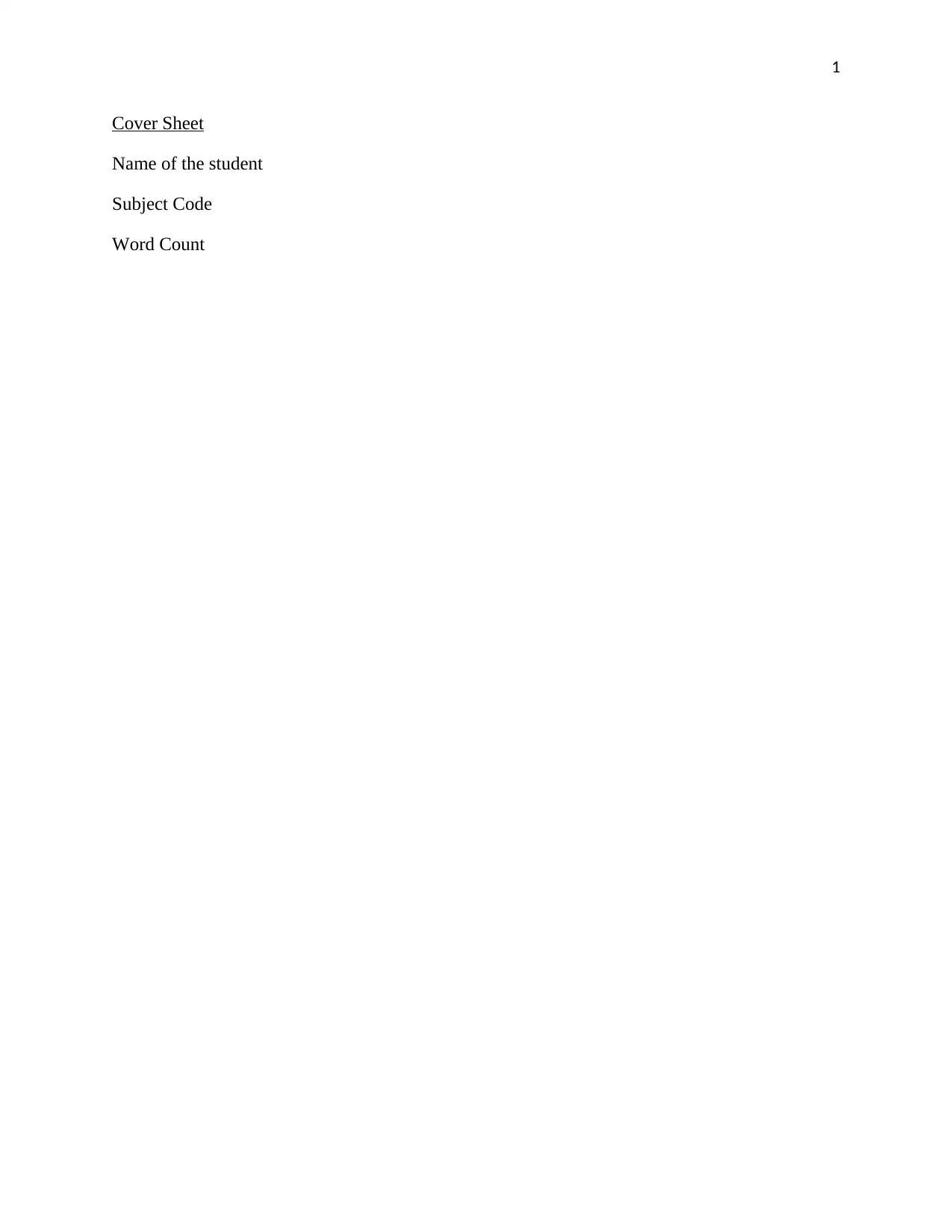
1
Cover Sheet
Name of the student
Subject Code
Word Count
Cover Sheet
Name of the student
Subject Code
Word Count
Paraphrase This Document
Need a fresh take? Get an instant paraphrase of this document with our AI Paraphraser
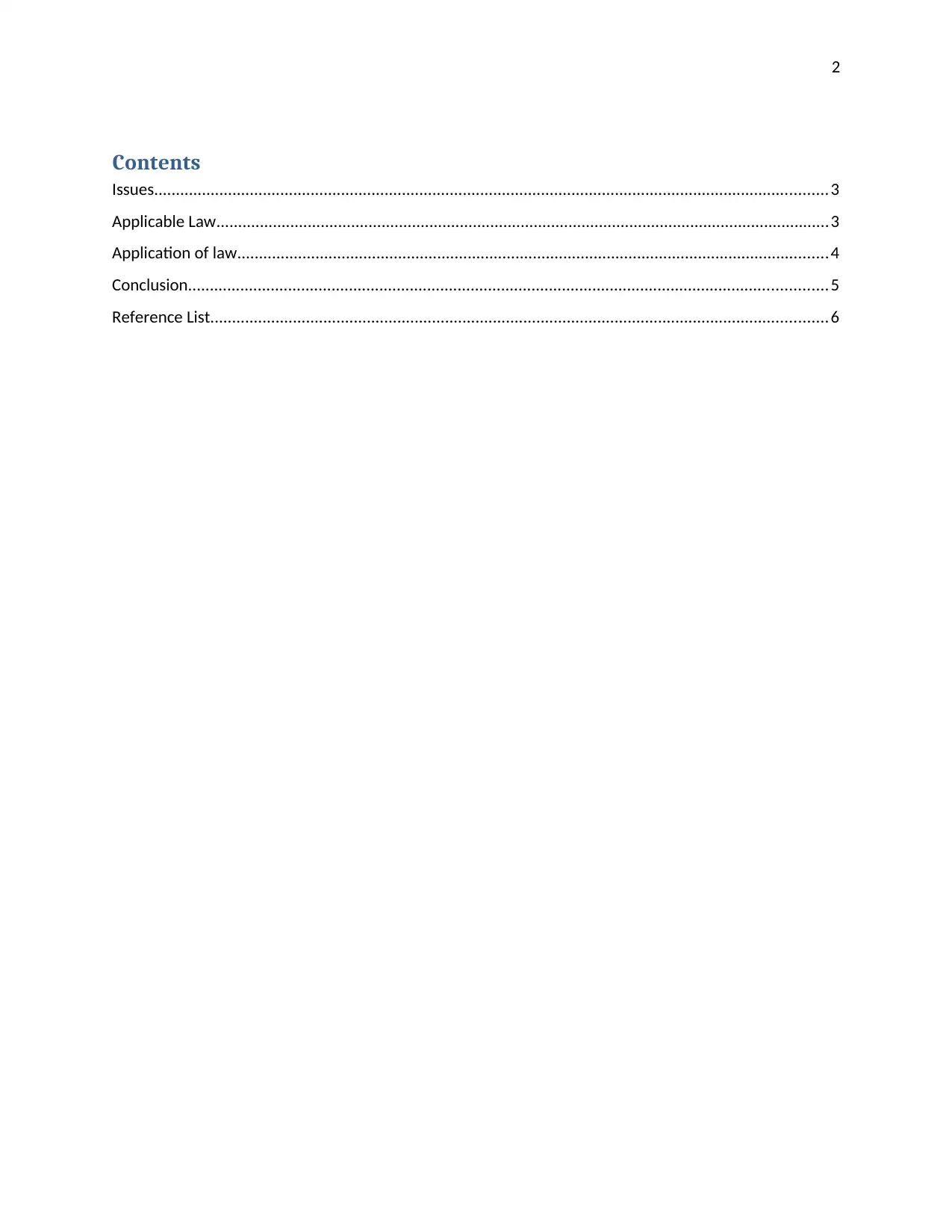
2
Contents
Issues...........................................................................................................................................................3
Applicable Law.............................................................................................................................................3
Application of law........................................................................................................................................4
Conclusion...................................................................................................................................................5
Reference List..............................................................................................................................................6
Contents
Issues...........................................................................................................................................................3
Applicable Law.............................................................................................................................................3
Application of law........................................................................................................................................4
Conclusion...................................................................................................................................................5
Reference List..............................................................................................................................................6
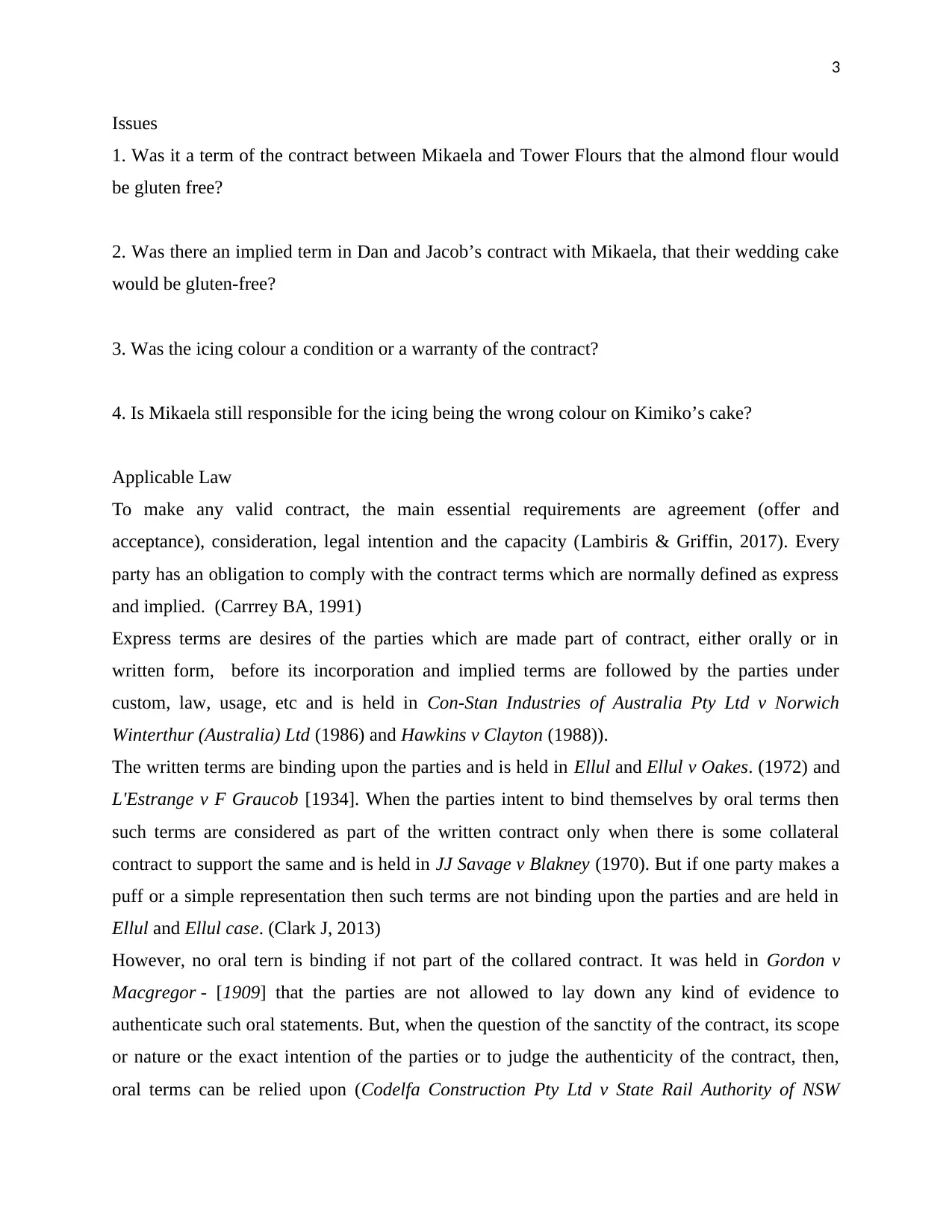
3
Issues
1. Was it a term of the contract between Mikaela and Tower Flours that the almond flour would
be gluten free?
2. Was there an implied term in Dan and Jacob’s contract with Mikaela, that their wedding cake
would be gluten-free?
3. Was the icing colour a condition or a warranty of the contract?
4. Is Mikaela still responsible for the icing being the wrong colour on Kimiko’s cake?
Applicable Law
To make any valid contract, the main essential requirements are agreement (offer and
acceptance), consideration, legal intention and the capacity (Lambiris & Griffin, 2017). Every
party has an obligation to comply with the contract terms which are normally defined as express
and implied. (Carrrey BA, 1991)
Express terms are desires of the parties which are made part of contract, either orally or in
written form, before its incorporation and implied terms are followed by the parties under
custom, law, usage, etc and is held in Con-Stan Industries of Australia Pty Ltd v Norwich
Winterthur (Australia) Ltd (1986) and Hawkins v Clayton (1988)).
The written terms are binding upon the parties and is held in Ellul and Ellul v Oakes. (1972) and
L'Estrange v F Graucob [1934]. When the parties intent to bind themselves by oral terms then
such terms are considered as part of the written contract only when there is some collateral
contract to support the same and is held in JJ Savage v Blakney (1970). But if one party makes a
puff or a simple representation then such terms are not binding upon the parties and are held in
Ellul and Ellul case. (Clark J, 2013)
However, no oral tern is binding if not part of the collared contract. It was held in Gordon v
Macgregor - [1909] that the parties are not allowed to lay down any kind of evidence to
authenticate such oral statements. But, when the question of the sanctity of the contract, its scope
or nature or the exact intention of the parties or to judge the authenticity of the contract, then,
oral terms can be relied upon (Codelfa Construction Pty Ltd v State Rail Authority of NSW
Issues
1. Was it a term of the contract between Mikaela and Tower Flours that the almond flour would
be gluten free?
2. Was there an implied term in Dan and Jacob’s contract with Mikaela, that their wedding cake
would be gluten-free?
3. Was the icing colour a condition or a warranty of the contract?
4. Is Mikaela still responsible for the icing being the wrong colour on Kimiko’s cake?
Applicable Law
To make any valid contract, the main essential requirements are agreement (offer and
acceptance), consideration, legal intention and the capacity (Lambiris & Griffin, 2017). Every
party has an obligation to comply with the contract terms which are normally defined as express
and implied. (Carrrey BA, 1991)
Express terms are desires of the parties which are made part of contract, either orally or in
written form, before its incorporation and implied terms are followed by the parties under
custom, law, usage, etc and is held in Con-Stan Industries of Australia Pty Ltd v Norwich
Winterthur (Australia) Ltd (1986) and Hawkins v Clayton (1988)).
The written terms are binding upon the parties and is held in Ellul and Ellul v Oakes. (1972) and
L'Estrange v F Graucob [1934]. When the parties intent to bind themselves by oral terms then
such terms are considered as part of the written contract only when there is some collateral
contract to support the same and is held in JJ Savage v Blakney (1970). But if one party makes a
puff or a simple representation then such terms are not binding upon the parties and are held in
Ellul and Ellul case. (Clark J, 2013)
However, no oral tern is binding if not part of the collared contract. It was held in Gordon v
Macgregor - [1909] that the parties are not allowed to lay down any kind of evidence to
authenticate such oral statements. But, when the question of the sanctity of the contract, its scope
or nature or the exact intention of the parties or to judge the authenticity of the contract, then,
oral terms can be relied upon (Codelfa Construction Pty Ltd v State Rail Authority of NSW
⊘ This is a preview!⊘
Do you want full access?
Subscribe today to unlock all pages.

Trusted by 1+ million students worldwide
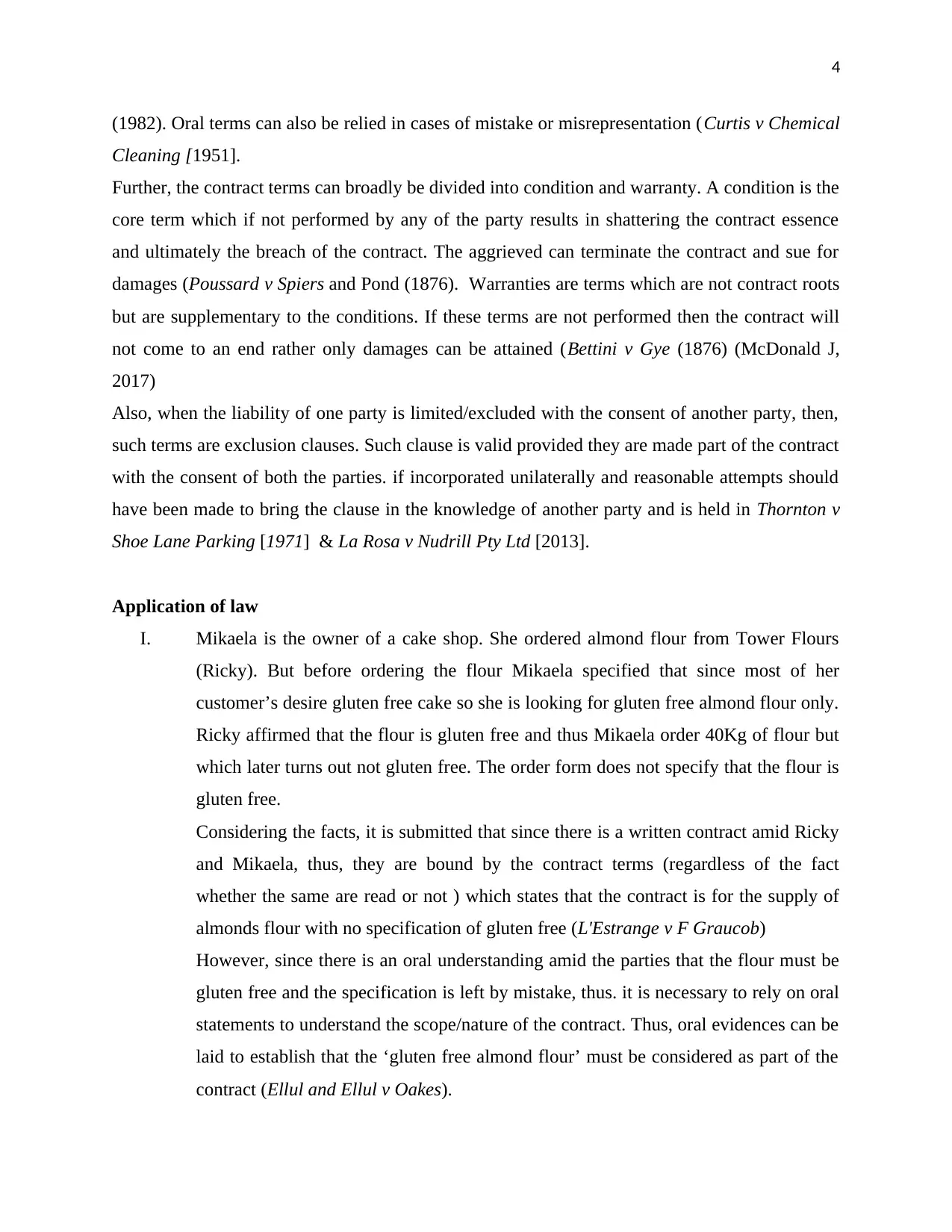
4
(1982). Oral terms can also be relied in cases of mistake or misrepresentation (Curtis v Chemical
Cleaning [1951].
Further, the contract terms can broadly be divided into condition and warranty. A condition is the
core term which if not performed by any of the party results in shattering the contract essence
and ultimately the breach of the contract. The aggrieved can terminate the contract and sue for
damages (Poussard v Spiers and Pond (1876). Warranties are terms which are not contract roots
but are supplementary to the conditions. If these terms are not performed then the contract will
not come to an end rather only damages can be attained (Bettini v Gye (1876) (McDonald J,
2017)
Also, when the liability of one party is limited/excluded with the consent of another party, then,
such terms are exclusion clauses. Such clause is valid provided they are made part of the contract
with the consent of both the parties. if incorporated unilaterally and reasonable attempts should
have been made to bring the clause in the knowledge of another party and is held in Thornton v
Shoe Lane Parking [1971] & La Rosa v Nudrill Pty Ltd [2013].
Application of law
I. Mikaela is the owner of a cake shop. She ordered almond flour from Tower Flours
(Ricky). But before ordering the flour Mikaela specified that since most of her
customer’s desire gluten free cake so she is looking for gluten free almond flour only.
Ricky affirmed that the flour is gluten free and thus Mikaela order 40Kg of flour but
which later turns out not gluten free. The order form does not specify that the flour is
gluten free.
Considering the facts, it is submitted that since there is a written contract amid Ricky
and Mikaela, thus, they are bound by the contract terms (regardless of the fact
whether the same are read or not ) which states that the contract is for the supply of
almonds flour with no specification of gluten free (L'Estrange v F Graucob)
However, since there is an oral understanding amid the parties that the flour must be
gluten free and the specification is left by mistake, thus. it is necessary to rely on oral
statements to understand the scope/nature of the contract. Thus, oral evidences can be
laid to establish that the ‘gluten free almond flour’ must be considered as part of the
contract (Ellul and Ellul v Oakes).
(1982). Oral terms can also be relied in cases of mistake or misrepresentation (Curtis v Chemical
Cleaning [1951].
Further, the contract terms can broadly be divided into condition and warranty. A condition is the
core term which if not performed by any of the party results in shattering the contract essence
and ultimately the breach of the contract. The aggrieved can terminate the contract and sue for
damages (Poussard v Spiers and Pond (1876). Warranties are terms which are not contract roots
but are supplementary to the conditions. If these terms are not performed then the contract will
not come to an end rather only damages can be attained (Bettini v Gye (1876) (McDonald J,
2017)
Also, when the liability of one party is limited/excluded with the consent of another party, then,
such terms are exclusion clauses. Such clause is valid provided they are made part of the contract
with the consent of both the parties. if incorporated unilaterally and reasonable attempts should
have been made to bring the clause in the knowledge of another party and is held in Thornton v
Shoe Lane Parking [1971] & La Rosa v Nudrill Pty Ltd [2013].
Application of law
I. Mikaela is the owner of a cake shop. She ordered almond flour from Tower Flours
(Ricky). But before ordering the flour Mikaela specified that since most of her
customer’s desire gluten free cake so she is looking for gluten free almond flour only.
Ricky affirmed that the flour is gluten free and thus Mikaela order 40Kg of flour but
which later turns out not gluten free. The order form does not specify that the flour is
gluten free.
Considering the facts, it is submitted that since there is a written contract amid Ricky
and Mikaela, thus, they are bound by the contract terms (regardless of the fact
whether the same are read or not ) which states that the contract is for the supply of
almonds flour with no specification of gluten free (L'Estrange v F Graucob)
However, since there is an oral understanding amid the parties that the flour must be
gluten free and the specification is left by mistake, thus. it is necessary to rely on oral
statements to understand the scope/nature of the contract. Thus, oral evidences can be
laid to establish that the ‘gluten free almond flour’ must be considered as part of the
contract (Ellul and Ellul v Oakes).
Paraphrase This Document
Need a fresh take? Get an instant paraphrase of this document with our AI Paraphraser
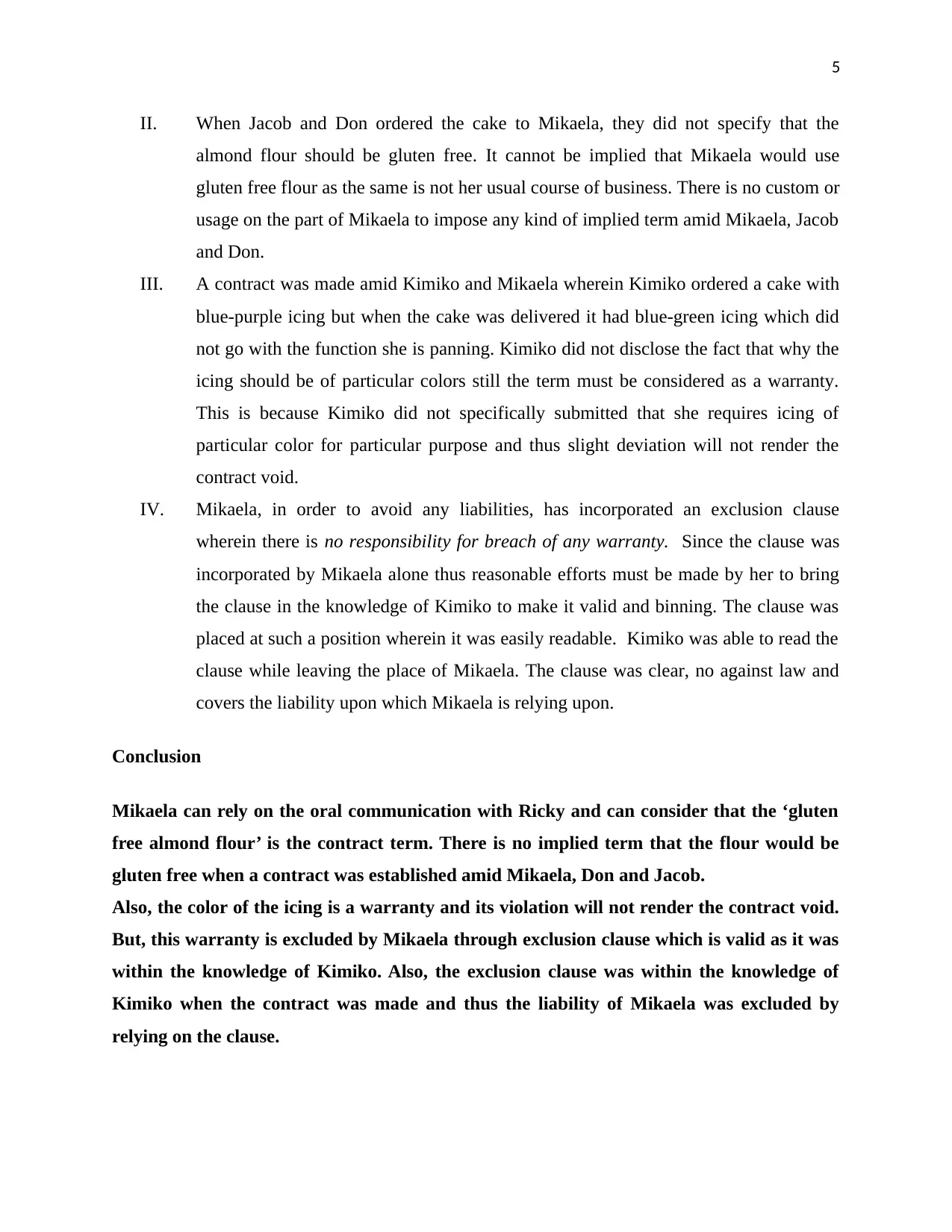
5
II. When Jacob and Don ordered the cake to Mikaela, they did not specify that the
almond flour should be gluten free. It cannot be implied that Mikaela would use
gluten free flour as the same is not her usual course of business. There is no custom or
usage on the part of Mikaela to impose any kind of implied term amid Mikaela, Jacob
and Don.
III. A contract was made amid Kimiko and Mikaela wherein Kimiko ordered a cake with
blue-purple icing but when the cake was delivered it had blue-green icing which did
not go with the function she is panning. Kimiko did not disclose the fact that why the
icing should be of particular colors still the term must be considered as a warranty.
This is because Kimiko did not specifically submitted that she requires icing of
particular color for particular purpose and thus slight deviation will not render the
contract void.
IV. Mikaela, in order to avoid any liabilities, has incorporated an exclusion clause
wherein there is no responsibility for breach of any warranty. Since the clause was
incorporated by Mikaela alone thus reasonable efforts must be made by her to bring
the clause in the knowledge of Kimiko to make it valid and binning. The clause was
placed at such a position wherein it was easily readable. Kimiko was able to read the
clause while leaving the place of Mikaela. The clause was clear, no against law and
covers the liability upon which Mikaela is relying upon.
Conclusion
Mikaela can rely on the oral communication with Ricky and can consider that the ‘gluten
free almond flour’ is the contract term. There is no implied term that the flour would be
gluten free when a contract was established amid Mikaela, Don and Jacob.
Also, the color of the icing is a warranty and its violation will not render the contract void.
But, this warranty is excluded by Mikaela through exclusion clause which is valid as it was
within the knowledge of Kimiko. Also, the exclusion clause was within the knowledge of
Kimiko when the contract was made and thus the liability of Mikaela was excluded by
relying on the clause.
II. When Jacob and Don ordered the cake to Mikaela, they did not specify that the
almond flour should be gluten free. It cannot be implied that Mikaela would use
gluten free flour as the same is not her usual course of business. There is no custom or
usage on the part of Mikaela to impose any kind of implied term amid Mikaela, Jacob
and Don.
III. A contract was made amid Kimiko and Mikaela wherein Kimiko ordered a cake with
blue-purple icing but when the cake was delivered it had blue-green icing which did
not go with the function she is panning. Kimiko did not disclose the fact that why the
icing should be of particular colors still the term must be considered as a warranty.
This is because Kimiko did not specifically submitted that she requires icing of
particular color for particular purpose and thus slight deviation will not render the
contract void.
IV. Mikaela, in order to avoid any liabilities, has incorporated an exclusion clause
wherein there is no responsibility for breach of any warranty. Since the clause was
incorporated by Mikaela alone thus reasonable efforts must be made by her to bring
the clause in the knowledge of Kimiko to make it valid and binning. The clause was
placed at such a position wherein it was easily readable. Kimiko was able to read the
clause while leaving the place of Mikaela. The clause was clear, no against law and
covers the liability upon which Mikaela is relying upon.
Conclusion
Mikaela can rely on the oral communication with Ricky and can consider that the ‘gluten
free almond flour’ is the contract term. There is no implied term that the flour would be
gluten free when a contract was established amid Mikaela, Don and Jacob.
Also, the color of the icing is a warranty and its violation will not render the contract void.
But, this warranty is excluded by Mikaela through exclusion clause which is valid as it was
within the knowledge of Kimiko. Also, the exclusion clause was within the knowledge of
Kimiko when the contract was made and thus the liability of Mikaela was excluded by
relying on the clause.
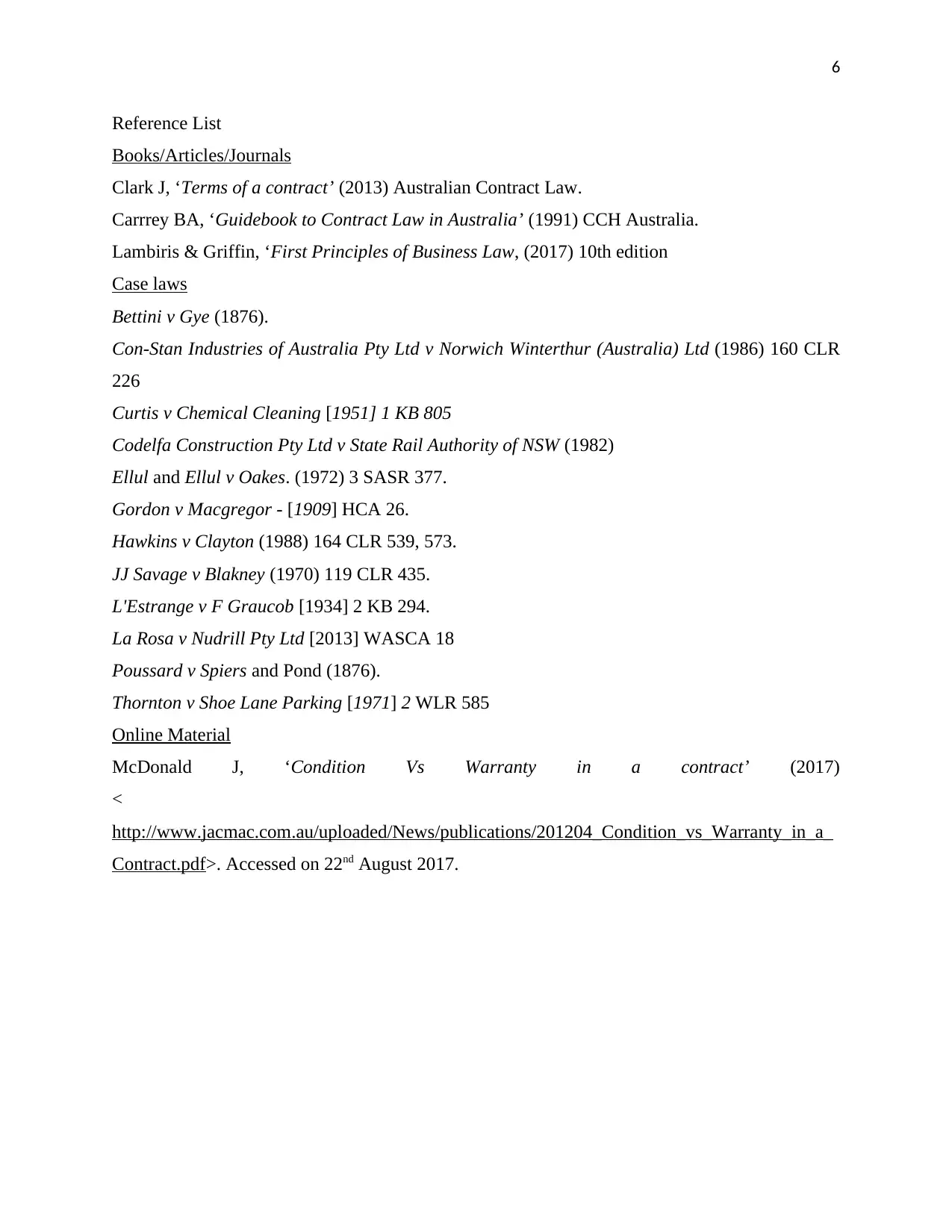
6
Reference List
Books/Articles/Journals
Clark J, ‘Terms of a contract’ (2013) Australian Contract Law.
Carrrey BA, ‘Guidebook to Contract Law in Australia’ (1991) CCH Australia.
Lambiris & Griffin, ‘First Principles of Business Law, (2017) 10th edition
Case laws
Bettini v Gye (1876).
Con-Stan Industries of Australia Pty Ltd v Norwich Winterthur (Australia) Ltd (1986) 160 CLR
226
Curtis v Chemical Cleaning [1951] 1 KB 805
Codelfa Construction Pty Ltd v State Rail Authority of NSW (1982)
Ellul and Ellul v Oakes. (1972) 3 SASR 377.
Gordon v Macgregor - [1909] HCA 26.
Hawkins v Clayton (1988) 164 CLR 539, 573.
JJ Savage v Blakney (1970) 119 CLR 435.
L'Estrange v F Graucob [1934] 2 KB 294.
La Rosa v Nudrill Pty Ltd [2013] WASCA 18
Poussard v Spiers and Pond (1876).
Thornton v Shoe Lane Parking [1971] 2 WLR 585
Online Material
McDonald J, ‘Condition Vs Warranty in a contract’ (2017)
<
http://www.jacmac.com.au/uploaded/News/publications/201204_Condition_vs_Warranty_in_a_
Contract.pdf>. Accessed on 22nd August 2017.
Reference List
Books/Articles/Journals
Clark J, ‘Terms of a contract’ (2013) Australian Contract Law.
Carrrey BA, ‘Guidebook to Contract Law in Australia’ (1991) CCH Australia.
Lambiris & Griffin, ‘First Principles of Business Law, (2017) 10th edition
Case laws
Bettini v Gye (1876).
Con-Stan Industries of Australia Pty Ltd v Norwich Winterthur (Australia) Ltd (1986) 160 CLR
226
Curtis v Chemical Cleaning [1951] 1 KB 805
Codelfa Construction Pty Ltd v State Rail Authority of NSW (1982)
Ellul and Ellul v Oakes. (1972) 3 SASR 377.
Gordon v Macgregor - [1909] HCA 26.
Hawkins v Clayton (1988) 164 CLR 539, 573.
JJ Savage v Blakney (1970) 119 CLR 435.
L'Estrange v F Graucob [1934] 2 KB 294.
La Rosa v Nudrill Pty Ltd [2013] WASCA 18
Poussard v Spiers and Pond (1876).
Thornton v Shoe Lane Parking [1971] 2 WLR 585
Online Material
McDonald J, ‘Condition Vs Warranty in a contract’ (2017)
<
http://www.jacmac.com.au/uploaded/News/publications/201204_Condition_vs_Warranty_in_a_
Contract.pdf>. Accessed on 22nd August 2017.
⊘ This is a preview!⊘
Do you want full access?
Subscribe today to unlock all pages.

Trusted by 1+ million students worldwide
1 out of 6
Related Documents
Your All-in-One AI-Powered Toolkit for Academic Success.
+13062052269
info@desklib.com
Available 24*7 on WhatsApp / Email
![[object Object]](/_next/static/media/star-bottom.7253800d.svg)
Unlock your academic potential
Copyright © 2020–2026 A2Z Services. All Rights Reserved. Developed and managed by ZUCOL.





